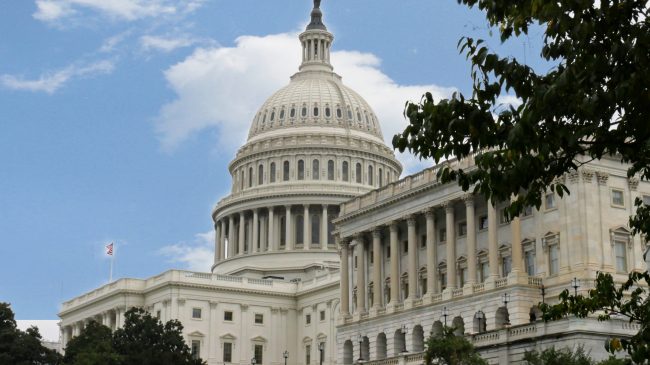While Speaker of the House Nancy Pelosi and Democrats are currently struggling to move forward on the $1.2 trillion bipartisan infrastructure bill passed by the Senate and $3.5 trillion reconciliation bill, much of which is social spending, the goal of the federal government continues to seem to be to pass deficit spending bills that increase the national debt. Despite dubious-at-best claims that future economic growth and higher government revenue would pay for the reconciliation and infrastructure bills, taxpayers have seen this play before. Both major political parties claim their bills will pay for themselves, but the national debt and deficits follow big spending bills like night follows day.
The nation’s attention has recently been on the rising national debt due to congress raising the debt ceiling. As Reuters reported:
The U.S. Senate approved legislation on Thursday to temporarily raise the federal government’s $28.4 trillion debt limit and avoid the risk of a historic default this month, but put off until early December a decision on a longer-lasting remedy.
The two major political parties may have different priorities, but when in control of the White House and Congress, they both present false choices of the debt ceiling that sound something like, ‘We have to raise the debt ceiling this time to avoid defaulting on our national debt because we can’t reduce any spending anywhere on any of our preferred programs and priorities while we’re in control of the government.’
Eventually, this piling up of debt and the runaway federal spending must be stopped. For decades members of Congress and presidents have demonstrated their unwillingness to control their debt-financed spending. When they have the opportunity to make and follow policies to restore prudent fiscal management and accountability, they choose instead to spend on their pet policies. At some point, those in the federal government need to learn to live within their, i.e. taxpayers’, means. Unfortunately, there is nothing in the U.S. Constitution requiring them to do so. When the Constitution was ratified, the federal budget was only $4 million. Today, the federal budget is $4 trillion.
As the national debt nears $29 trillion, the conversation about this problem needs to change. Article V of the Constitution provides that two-thirds of the states may call a Convention of the States to propose one or more amendments to the U.S. Constitution, without the approval of Congress, to impose and maintain fiscal responsibility upon the federal government. If such a convention were called, 38 states would then have to ratify any constitutional amendments for them to become part of the U.S. Constitution.
Such an outcome may seem quite improbable in the current polarized political times. But, throughout history states have acted several times in this way. There are debates amongst legal scholars over how specific or similar resolutions calling for a convention of the states must be. Under some counts, 33 states have passed resolutions calling for an Article V convention, and a 34th state, creating the needed two-thirds majority, seems likely to pass it next year. In terms of a specific resolution, in 2019, the Colorado Fiscal Institute said states were getting close to the needed number on a balanced budget amendment:
The Balanced Budget Amendment Task Force (BBATF), one of the primary groups working towards a balanced budget amendment, began in 1957 when Indiana passed the first Article V resolution on this topic. Today, 28 states – including Colorado – have passed resolutions calling for a convention to discuss a balanced budget amendment. That means if six more states call for a balanced budget amendment, a constitutional convention could be convened. Idaho, Kentucky, Minnesota, Montana, South Carolina, Virginia, and Washington have all been targeted by BBATF.
The process of creating a constitutional convention to consider amendments to constrain federal spending and debt would likely radically change the tired existing debates around federal spending and the national debt. A convention would also be a real opportunity to finally create some sensible constraints on federal spending and taxation, requiring sensible financial management, transparency, and accountability from the federal government.
When political leaders are ready to address these issues, we have developed a package of proposals, The Bill of Financial Responsibilities, showing how they can start to tackle the nation’s troubling debt.

